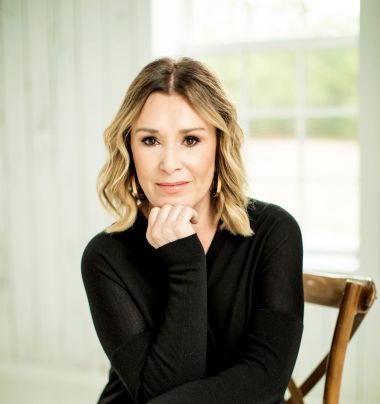Holding on when you want to let go

Sheila Walsh is a contemporary Christian singer, television host and best-selling author who has sold over five million books and recorded 25 albums with multiple top 10 singles. In 2020, she recorded the single "It Is Well" with Sir Cliff Richard.
Christian Today's Charlene Nwodo spoke to Walsh about her latest book Holding On When You Want To Let Go, the idea behind it and how its message can help those who are struggling and in pain.
CT: What was the idea behind your newest book?
Sheila: The idea of the book came out of my own personal struggle. I was hospitalised for severe clinical depression. I have been doing well. I am very faithful to take my medication and to take care of myself.
But when the pandemic began, I found myself spiralling again. I usually go out on weekends and speak, but suddenly everything was closed. Also watching the local news of the local community of the people who were hurting, losing jobs and kids who were struggling [impacted me].
The idea for the book really came out of asking the Lord how we live in days like this. I knew how to live [before the pandemic], but I did not really know what to do now. I went on my Facebook page one night and asked how people were doing, and I realised that I was not the only who was struggling. The book was really written out more of a broken place rather than here is everything I know.
I remembered what Ruth Graham - Billy Graham's wife, who was like a spiritual mother to me - had told me. She had said: "If you're really asking for God on answers for something, dive deep into the Word, but don't just read current books, go as far back as you possibly can. Because our brothers and sisters have left a roadmap [for us]."
I found an amazing quote by Athanasius, a bishop who lived in the fourth century. It says: "Most of Scripture speaks to us; the Psalms speak for us." I read three Psalms outloud every day because it is good for my ears to hear what my eyes are reading.
CT: Who wrote your book during a global pandemic. How have you remained faithful in this season?
Sheila: I have been reminding myself of what is always true, no matter what may be true for a moment. I am a real Bible geek; I love to study, and I love to try to find some words in the original language to see if there is a bigger message behind what I am studying.
Romans chapter 8 is one of my favourite chapters in the Bible. In Romans 8:38, Paul writes: "I am convinced that nothing can separate us from the love of God in Christ Jesus."
The way he wrote it in the present perfect tense really hit me. He meant: "I was convinced, and I remain convinced."
Acts 6 tells us about the dramatic conversion that Paul had when he was on his way to Damascus. But Paul wrote this letter to the church in Rome almost 20 years later. [In the time between his conversion and him writing the letter] he had been stoned and left for dead, he had been in prison, he had been starved, he had been shipwrecked. It was so encouraging that a brother of ours said: "Yes, I was convinced, but I remain convinced that nothing can separate us from the love of Christ."

I am reminding myself that God is still on the throne, that God is good no matter what the news or the newspaper or social media say. I used to watch the news in the morning and then read my Bible; I have reversed that because I felt as if I was reading my Bible through the lens of what was going on in the world as opposed to watching the news through the lens of the Word of God.
CT: How did the process of writing "Holding On When You Want to Let Go" change your personal relationship with God?
Sheila: There are some people that write from a place of great understanding, great knowledge and expertise. For all my books, I tend to write from the place of a journey of asking God, "What do we do here?"
The first half of the book covers what I heard about from my friends and Facebook Community about their struggles.
In the second half of the book, I move to looking at who Jesus is. When we look at Joseph's life in the Old Testament, for example, he is a teenager when he knows that something amazing is going to happen to him. But then disaster strikes, he is trafficked by his brothers to another country, and he is thrown in prison. The interesting thing when I studied this in Genesis is that in all those terrible moments, it says that "God was with him".
God always has a rescue plan. It does not always look like what we think it will look like. On some days, we think what God has promised happens in a timeframe that makes sense to us. I am learning to trust God in the process of what I don't understand.
CT: What is your advice to those who experience hardship not based on their mistakes but because of other people's actions?
Sheila: My son Christian is now 25. I remember, when he was around 10, I took him to the ice-cream store after school. After we had finished, he told me that his best friend at that time had done something and had blamed Christian for it, and the teacher had believed him. Christian told his friend at lunchtime that his friend should tell the teacher that it was him. His friend didn't want to it. So, Christian said that firstly, he was no longer his friend and secondly, that the boy was off his prayer list.
Later that night, I told Christian to go for a walk with me, and I asked him to get the big flour bag I had bought from Costco. And as we were walking along, Christian asked if we were there yet, but I told him that we had to walk a little further. Walking back, eventually, he sat down on the grass and said that he could no longer carry the flour.
I told him: "Maybe this looks like when you don't forgive. Your friend has probably been asleep for 20 minutes. You are the one who is out here, carrying a bag of flour. You want life to be fair, which I completely understand. Fair does not live here, but Jesus does. When you are dropping what you are carrying, you are telling God that there is nothing you can do about this, that this was not your fault. The other person refuses to take responsibility, but you are letting go of this weight."

A few weeks ago I was at the airport and our flight was delayed for the third time and I grabbed a cup of coffee. A woman came up to me and asked if she had seen me on television. When I told her that it had probably been me, she asked to join me. She told me her story and how she had worked very hard and how she had put her husband through medical school. He ended up leaving her for a younger woman. Tears were pouring down her face, it felt so fresh, but I was blown away when she told me that it had happened 20 years ago.
It is so easy to get trapped in a place like this. Because you think, "Lord, do you see what went on here and this person is just moving on, and I am stuck." But because of Jesus, we are not stuck. We do not have to pretend, and some things are clearly not okay, but we are reminded of God's promise. In Romans 8:28 we are not promised that all things are good or feel good, but we are promised that He will bring good from everything. So, I bring all the broken pieces of my story, and I am going to trust to Him to fulfil His promise.
CT: What is the most important message that you want to convey through your book?
Sheila: When I was close to finishing writing this book, I was thinking of many people whose messages I had read on my Facebook page a few days ago [and about the struggles they were experiencing].
I wrote the last chapter on the fact that we are being held because there are times when we are clinging by a thread and cannot hold on. I wanted to remind people that they are surrounded by the love of God: He goes before you, He is behind you, He is underneath you.
It was John Calvin who made a point about what Jesus did for us. Looking at the three crosses on the hill and the fact that they placed Christ on the centre cross made him look like a ringleader and like the worst out of them. Christ was willing to take on the worst of everything, so that you and I would know that no matter what is going on, we're being held.
CT: Do you have a favourite Bible verse that you go back to when you encounter adversity?
Sheila: I love Psalms 27:1: "The Lord is my light and my salvation, whom shall I fear? The Lord is a stronghold of my life, of whom shall I be afraid?"
Salvation means both to save and to heal. I love that it talks about the fact that there are days when I am not going to be strong, when life is going to be dark, but God is my light and my strong salvation; He holds us, He saves us, and He heals us.











